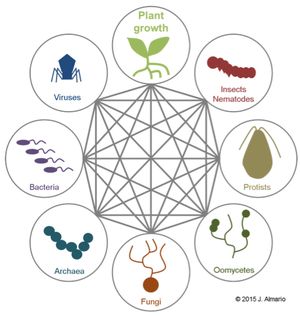The importance of microbial networks for plant health
Like us humans, plants cohabit with a high number of microorganisms nesting on and in their tissues forming their microbiome. The rhizosphere comprises the soil layer directly in contact with plant roots. Due to a wealth of exuded plant metabolites it is a hot spot for the activity of highly diverse bacteria, archaea, fungi, oomycetes, and microfauna including protists and small insects. Sharing the same space, these microbes interact behaving like allies or enemies and thus they form complex networks of interactions.
Often, the outcome of these below ground trading has a major impact on aboveground plant growth. Although the effect is not always positive, plant growth can be improved through the mobilization and/or the transfer of important nutrients like phosphorus and nitrogen through these microbial networks. This is exemplified by some rhizospheric fungi parasitizing insect larvae to capture nitrogen and transfer it to the plant. Another example are bacteria-eating protists which release nutrients from consumed bacteria making these nutrients available to the plant. In addition to improving plant nutrition, this microbial food web has biocontrol functions and defends the plant against pathogens, for example through the production of antimicrobials.
In CEPLAS scientists within research areas C and D aim at understanding these complex interactions and how they can be exploited to improve plant health. The complexity of this microbial network can now be unraveled through the combination of state-of-the-art sequencing technologies, computational and statistical analysis of microbiome data, and culture-based approaches. Manipulation of the plant microbiome has the potential to reduce the occurrence of plant disease, increase agricultural production, reduce input of chemicals and reduce emissions of greenhouse gases, resulting in a more sustainable agriculture. This goal is seen as vital for sustaining the world’s growing population.
Contribution by Juliana Almario, Botanical Institute, Cologne Biocenter
Planter’s Punch
Under the heading Planter’s Punch we present each month one special aspect of the CEPLAS research programme. All contributions are prepared by our young researchers.
